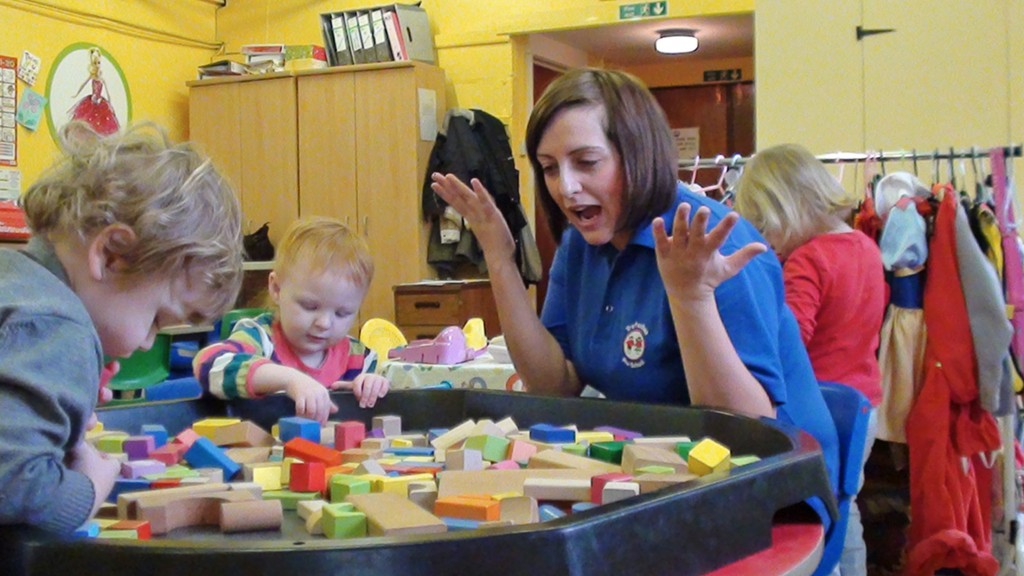 An evidence-based, professional development programme for all people working with children aged 0-5 years in a variety of early childhood settings – including childcare, pre-school and nursery/reception class.
An evidence-based, professional development programme for all people working with children aged 0-5 years in a variety of early childhood settings – including childcare, pre-school and nursery/reception class.
In any preschool classroom, the needs of children can be very diverse, and some can be much harder to engage and teach than others. This makes your job as an early childhood educator difficult when you’re trying to make sure that every child in your classroom is given the best possible opportunities for learning.
The Learning Language and Loving It™ Programme was designed to provide early childhood educators (qualified and unqualified) with practical strategies for helping all children in the classroom build language and social skills, no matter what their learning and communication styles are, and even if they have special needs.
The Learning Language and Loving It™ Programme provides you with practical, research-based strategies for:
- Promoting every child’s language development using natural everyday activities, routines and play
- Becoming attuned to children’s interests so you can follow their lead, which is known to foster language development
- Adjusting the way you talk to help children develop more advanced language skills
- Promoting interaction among the children themselves
- Facilitating language-learning in pretend play
- Fostering emergent literacy skills
In a comfortable, small-group environment, programme participants gain the knowledge, skills and tools they need to make language and literacy-learning a fun and natural part of every child’s day.
The Programme
The comprehensive 10 to 14 week programme involves group teaching sessions, workplace visits and personalised learning tasks. Individual videoing and feedback sessions enable staff to develop reflective practice skills and implement strategies learned in training.The Programme includes:
- A Hanen Certified speech and language therapist leading the programme to a group of up to 20 educators
- 5-8 intensive group training sessions (15-20 hours) learning through a variety of media and by interacting with fellow educators
- 4-6 individual videotaping and feedback sessions for each participant (interactions with children are videotaped and reviewed with the group leader)
- User-friendly resources to support participants’ learning
What are the benefits of the Learning Language and Loving It™ Programme?
Practical strategies you can use during everyday activities and routines
Learning Language and Loving It™ strategies can be easily woven into everyday classroom activities. Each strategy is designed to engage and maintain the interest of the children, making language and literacy-learning a fun and natural part of their day.
The program will provide you with ample opportunity to practice each strategy with the children you work with, and to receive feedback from the Program Leader to help you adapt the strategies, as needed.
You’ll learn three kinds of responsive interaction strategies that are known to promote the social, language and emergent literacy development of preschool children. These are:
- Child-oriented strategies – These strategies encourage children to initiate and engage in conversational interactions so that educators can respond in ways that encourage the child’s continued engagement in the interaction.
- Interaction-promoting strategies – These strategies encourage extended individual and group conversations between adults and children.
- Language-modelling strategies – These strategies expand the child’s oral language skills and facilitate the development of decontextualized (or abstract) language.
Assurance that all children in the classroom will benefit
Using the Learning Language and Loving It™ approach ensures that every child in your classroom will receive the help and encouragement he needs. That’s because Learning Language and Loving It™ has a three-pronged, comprehensive approach aimed at:
- Prevention of Language Delays for children at risk and second-language learners;
- Early Language Intervention for children with language delays; and
- Language Enrichment for typically developing children.
An evidence-based and reputable program
Developed by expert speech-language pathologists and grounded in the most current research in the field of early childhood education, the Learning Language and Loving It™ Programme has been field-tested and rigorously examined using randomised controlled trials. Its efficacy has been supported in a series of studies showing positive changes for both educators and children.
Info from The Hanen Centre



